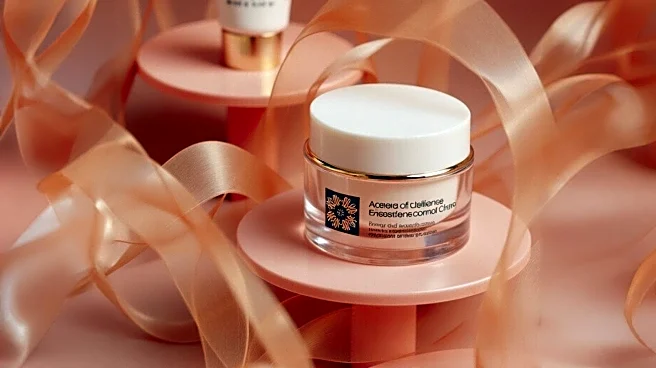What's Happening?
Skincare brands are responding to the effects of GLP-1 weight-loss drugs, which have become widely used in the U.S., with new products designed to address skin changes associated with these medications.
Dermatologists and plastic surgeons have observed that users of GLP-1 drugs often experience skin that appears thinner and prematurely aged, a phenomenon dubbed 'Ozempic Face.' In response, skincare companies have developed serums and creams aimed at counteracting these effects by boosting collagen production and improving skin hydration. Products like DermaReverse and SkinCeuticals A.G.E. Interrupter Ultra Serum are among the new offerings targeting these specific skin concerns.
Why It's Important?
The development of skincare products specifically for GLP-1 users highlights the growing intersection between pharmaceuticals and cosmetics. As the use of GLP-1 drugs continues to rise, with projections of up to 30 million users by 2030, the demand for solutions to address their side effects is increasing. This trend could lead to significant shifts in the skincare industry, as brands innovate to meet the needs of this expanding consumer base. Additionally, the focus on collagen and hydration in these products may influence broader skincare trends, emphasizing the importance of maintaining skin health amidst rapid weight loss.
What's Next?
As the market for GLP-1 skincare products grows, further research and development are expected to refine these offerings. Dermatologists and cosmetic chemists are likely to continue exploring the mechanisms by which GLP-1 drugs affect skin, potentially leading to more targeted and effective solutions. The skincare industry may also see increased collaboration with medical professionals to ensure products are scientifically validated. Consumers can anticipate more options tailored to their specific needs, as well as potential advancements in skincare technology that address the unique challenges posed by GLP-1 drug use.
Beyond the Headlines
The emergence of GLP-1 skincare products raises questions about the ethical implications of marketing cosmetics to address drug side effects. As companies capitalize on this trend, it is crucial to distinguish between scientifically backed solutions and marketing hype. The focus on aesthetics also underscores societal pressures related to appearance, particularly in the context of weight loss. This development may prompt discussions about the balance between health and beauty, and the role of skincare in supporting overall well-being.










